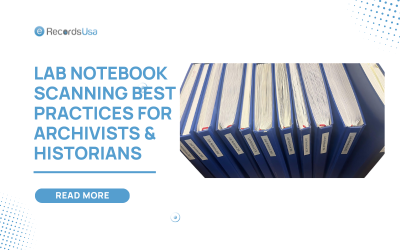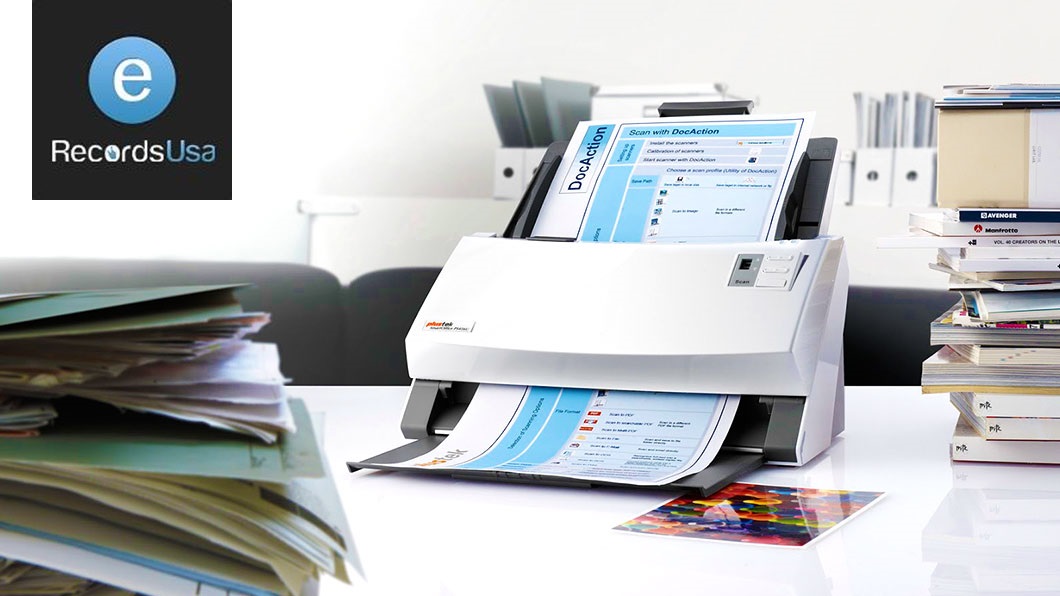What happens when historical research records fade, deteriorate, or are lost forever? Some of the most groundbreaking scientific discoveries exist only in fragile, handwritten lab notebooks. These documents hold immense historical and intellectual value, yet time, environmental factors, and improper storage threaten their longevity.
For archivists and historians, preserving these records is essential to maintaining an accurate scientific and historical legacy. However, physical preservation alone is not enough. Traditional storage methods come with risks—fading ink, paper degradation, and limited accessibility to researchers worldwide. Without intervention, critical knowledge could vanish.
This is where lab notebook scanning becomes indispensable. Digitization transforms aging, delicate notebooks into high-resolution, searchable digital archives, ensuring long-term protection and accessibility. With advanced Optical Character Recognition (OCR) and metadata tagging, historians and researchers can effortlessly retrieve, analyze, and cross-reference these documents without the risk of further deterioration.
In this article, we will explore:
- The role of archivists and historians in safeguarding research records.
- The challenges of preserving physical lab notebooks.
- How lab notebook scanning solves preservation and accessibility issues.
- Key scanning technologies and their impact on digital archiving.
- How to choose a scanning service that meets archival standards.
By adopting modern digital preservation strategies, museums, universities, and research institutions can future-proof invaluable scientific records. If you’re responsible for protecting historical lab notebooks, now is the time to digitize and safeguard these irreplaceable assets.
How Archivists and Historians Preserve Research Records with Lab Notebook Scanning?
Who ensures that groundbreaking scientific discoveries remain accessible for future generations? Archivists and historians play a critical role in maintaining and protecting research records, ensuring that valuable scientific insights are not lost to time. By meticulously preserving lab notebooks, these professionals help document the evolution of knowledge, safeguard intellectual property, and provide a foundation for future research.
How Archivists Use Lab Notebook Scanning for Scientific Knowledge Preservation?
Archivists specialize in preserving the integrity of original research through proper cataloging, storage, and digital conversion. Their work ensures that:
- Scientific records are organized, indexed, and accessible to researchers.
- Environmental threats such as humidity, pests, and ink deterioration are mitigated.
- Records are digitized to prevent loss and enable long-term preservation.
- Compliance with archival best practices and legal requirements for research documentation is maintained.
With the rise of digital preservation, archivists increasingly focus on scanning, metadata tagging, and implementing secure digital storage solutions to safeguard fragile historical lab notebooks.
Lab Notebook Scanning for Historians: Enhancing Scientific Research Accessibility
Historians rely on original research documentation to trace the evolution of scientific theories and technological advancements. Lab notebooks provide firsthand insights into:
- The process of discovery, reveals how experiments were conducted and refined.
- The historical context in which scientific breakthroughs emerged.
- The collaborations and influences that shaped research outcomes.
- The intellectual property rights associated with scientific documentation.
By digitizing lab notebooks, historians gain access to searchable, well-preserved records, making it easier to compare methodologies, verify claims, and connect past discoveries with present research.
Why Archivists and Historians Struggle with Physical Records – and How Scanning Solves It?
What are the biggest threats to historical lab notebooks? Physical research records face multiple preservation challenges, from deterioration to accessibility issues. Here’s a structured breakdown:
Common Challenges of Preserving Physical Lab Notebooks
| Challenge | Description | Impact |
|---|---|---|
| 📜 Physical Deterioration | Ink fading, paper brittleness, mold, and fire/water damage. | ❌ Loss of readability and historical accuracy over time. |
| 📦 Storage Limitations | Lack of space, high costs for climate-controlled storage, and risk of misplacement. | ❌ Physical records are difficult to manage, leading to loss or neglect. |
| 🔍 Accessibility Issues | Physical records are location-dependent, fragile, and require in-person retrieval. | ❌ Limits collaboration and research efficiency. |
Lab Notebook Scanning: A Digital Solution to Research Preservation Challenges
Can digitization eliminate the risks associated with preserving historical lab records? Physical lab notebooks face significant challenges, but digital transformation offers a scalable and effective solution. By integrating archival technology, structured metadata, and AI-driven indexing, scanning enhances accessibility, security, and long-term preservation for research institutions, libraries, and museums.
1. Digital Preservation & Lab Notebook Scanning: Preventing Research Data Loss
Digitization extends the lifespan of lab notebooks by eliminating the risk factors associated with paper-based storage. This process:
- Reduces handling, preventing ink fading and paper wear.
- Prevents irreversible damage from exposure to moisture, pests, or fire hazards.
- Creates restoration opportunities, enabling faded content to be enhanced digitally.
2. Expanded Accessibility: Removing Geographical and Institutional Barriers
Unlike physical archives, digitized research records can be accessed remotely, reducing dependency on specific storage locations. Key benefits include:
- Global access via cloud-based repositories for research universities, national archives, and scientific institutions.
- Digital indexing, allowing institutions to classify and retrieve notebooks based on themes, experiments, or contributors.
- Enhanced collaboration among historians, researchers, and data scientists through interconnected digital databases.
3. Lab Notebook Scanning: Improving Research Searchability
Without digitization, manually locating specific data points in historical lab notebooks is inefficient. Modern OCR (Optical Character Recognition) and indexing resolve this by:
- Converting handwritten or printed text into machine-readable content.
- Enabling metadata tagging, linking records to relevant researchers, dates, and institutions.
- Integrating knowledge graphs, allowing researchers to trace scientific discoveries, methodologies, and breakthroughs across different periods.
Key Features of Lab Notebook Scanning for Research & Historical Preservation
| Feature | Purpose | Key Technologies & Relational Entities |
|---|---|---|
| 📷 High-Resolution Scanning | Ensures the clarity of handwritten notes, diagrams, and annotations. | 🔹 Ultra-HD document scanning 🔹 Multi-spectral imaging 🔹 Manuscript restoration tools |
| 🤖 OCR & AI Processing | Converts handwritten content into searchable, indexed data. | 🔹 Handwriting recognition AI 🔹 Semantic text analysis 🔹 Historical document transcription systems |
| 🗂️ Preservation-Grade File Formats | Prevents data loss and ensures long-term access. | 🔹 PDF/A 🔹 TIFF 🔹 JPEG2000 🔹 Metadata-embedded storage |
Why Archivists & Historians Rely on Lab Notebook Scanning for Research Preservation?
Why should archivists and historians prioritize lab notebook scanning? Beyond simply preserving fragile records, digitization enhances accessibility, collaboration, and knowledge discovery.
Here is the list of Benefits of Lab Notebook Scanning for Archivists and Historians that will make you wow!!!
1. Lab Notebook Scanning for Long-Term Research Preservation & Security
Physical documents degrade over time, but digital archives ensure that scientific discoveries and historical insights remain intact indefinitely. The advantages include:
- Permanent preservation—reducing the risk of ink fading, paper decay, or physical loss.
- Disaster recovery assurance—digital backups prevent loss due to fire, floods, or theft.
- AI-powered restoration—digitally enhances damaged or faded text, making it legible again.
2. Digitized Lab Notebooks: Enabling Global Research Collaboration
Unlike physical records stored in restricted archives, digitized lab notebooks can be shared globally, allowing researchers, scholars, and historians to:
- Access records remotely, removing geographical limitations.
- Cross-reference historical data, linking research across institutions.
- Collaborate on digital platforms, such as institutional repositories, scientific databases, and open-access initiatives.
3. Lab Notebook Scanning Improves Research Discoverability & Knowledge Sharing
Metadata tagging, AI-enhanced indexing, and full-text searchability make retrieving information from digitized lab notebooks faster and more efficient. Benefits include:
- Keyword-based searchability, eliminating the need to manually sift through pages.
- Categorized archival records, structuring data for efficient retrieval.
- AI-driven data mining, extracting historical patterns, methodologies, and correlations in research.
By leveraging digitization, AI-driven indexing, and global accessibility features, archivists and historians can preserve, protect, and share historical scientific records more effectively than ever.
How to Choose the Best Lab Notebook Scanning Service for Research Archives?
How can archivists and historians ensure they select the best scanning service for historical preservation? Not all digitization services meet the rigorous standards required for scientific research documentation, cultural heritage archives, and academic institutions.
Selecting a service provider who specializes in archival-grade digitization is critical to ensure authenticity, longevity, and searchability. This section highlights the key factors to consider, ensuring that historical lab notebooks are preserved with the highest fidelity and accessibility standards.
1. Selecting a Lab Notebook Scanning Provider with Expertise in Historical Preservation
Why It Matters: Historical records require delicate handling, advanced scanning techniques, and compliance with archival best practices. Service providers must:
- Have experience scanning fragile manuscripts without causing physical damage.
- Follow archival preservation standards, such as FADGI (Federal Agencies Digital Guidelines Initiative) and ISO 19005 (PDF/A archival standard).
- Offer conservation expertise, ensuring proper document stabilization and restoration before scanning.
2. Use of Advanced Technology: Ensuring High-Quality and Searchability
Why It Matters: Basic scanning services may provide low-resolution images without OCR, limiting accessibility and research usability. A professional archival service should offer:
- High-resolution scanning to capture even faint handwriting, annotations, and diagrams.
- OCR and metadata integration to enable full-text searchability.
- Multi-spectral imaging for deciphering faded or erased content.
3. Secure & Compliant Lab Notebook Scanning Protects Research Integrity
Why It Matters: Research institutions must protect intellectual property, historical authenticity, and long-term accessibility. A trusted scanning provider must:
- Follow strict data security protocols to prevent unauthorized access or loss.
- Ensure file format longevity, using standards such as TIFF, JPEG2000, and PDF/A.
- Comply with academic and legal policies, such as GDPR (General Data Protection Regulation) for data handling.
By selecting a trusted, technologically advanced scanning provider like eRecordsUSA, archivists, and historians can ensure the preservation, accessibility, and integrity of historical research records for future generations.
Why Our Lab Notebook Scanning Service is the Best for Research Preservation?
As a leading provider of archival-grade lab notebook scanning, we specialize in preserving, digitizing, and securing fragile historical documents. Our advanced technology and expertise in scientific research preservation, metadata structuring, and AI-driven searchability ensure that your records remain intact, accessible, and searchable for future generations.
1. Expert Lab Notebook Scanning for Scientific & Historical Document Preservation
What Sets Us Apart?
- Decades of experience handling fragile, handwritten scientific notebooks.
- Compliance with archival best practices, including FADGI, ISO 19005, and GDPR standards.
- Collaboration with museums, universities, and national archives to preserve research legacies.
2. Cutting-Edge Lab Notebook Scanning: Ensuring Research Data Security & Searchability
Why Our Technology Stands Out
- Ultra-high-resolution imaging, capturing every fine detail, annotation, and faded ink.
- AI-powered OCR technology, making handwritten notes fully searchable.
- Metadata-rich tagging, ensuring proper categorization and fast retrieval of scanned records.
3. Secure & Future-Proof Lab Notebook Scanning: Ensuring Compliance & Long-Term Preservation
How We Protect Your Data
- Industry-leading security protocols, preventing data breaches or unauthorized access.
- Checksum verification for authenticity, ensuring your files remain intact over time.
- Cloud-based and on-premise storage options, tailored to academic, institutional, and private needs.
By choosing our specialized lab notebook scanning service, archivists, and historians gain access to the highest-quality preservation solutions, cutting-edge technology, and industry-leading security measures. Preserve history with confidence—digitize today!














